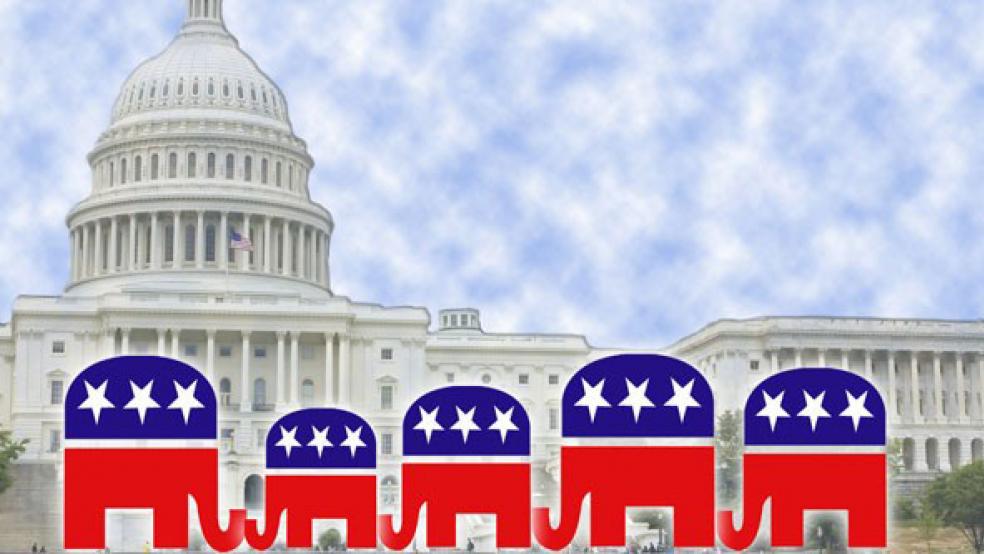The national Republican brand is in trouble. According to a recent Quinnipiac University poll, 71 percent of the public disapproves of the party. An in-house post-mortem of the 2102 election found that the party was in danger of becoming irrelevant if it didn’t change its policies.
At the same time, national stars of the party appeal to a narrow section of the American public. Sens. Ted Cruz (Tx.) and Rand Paul (Ky.) are popular with the tea party wing of the party, but their national appeal remains unknown. Sen. Marco Rubio, long considered a politician who can extend an olive branch to immigrants, has been spurned by the far right after pushing bipartisan immigration reform, a process that has stalled in the House.
Meanwhile, Democrats are enjoying a run of success on the national stage. Despite gridlock in Washington, President Obama and Vice President Joe Biden remain popular. Hilary Clinton has been lavished by praise since she left the State Department, and is considered the front-runner in the 2016 presidential race. Her husband Bill has proven to be a valuable asset on the campaign trail.
Given the popularity of Democratic figureheads and the GOP’s refusal to take its own advice, one might think that Democrats would hold a national advantage over Republicans for decades. But that isn’t the case.
The Democratic Party has a surprisingly short-bench, meaning that it has few rising stars to replace figures like Obama and Clinton once they retire from the main political stage. In addition, the GOP holds a broad advantage over Democrats at the state level, giving them not just a leg-up in the House, but a large stable of candidates that might be more appealing to a national audience.
The Democratic Short Bench
As soon as he entered the Senate, it was obvious that Barack Obama would one day be the face of the Democratic Party. His rise to power was faster than expected, but it was not unexpected.
This rise delayed Hilary Clinton’s time in the sun: she had been pegged as a national party leader as soon as her husband left the White House. She’s poised to take her place as the fact of the party in the upcoming presidential campaign.
But look beyond the current party stalwarts. There are few names that the general public would recognize. And there don’t appear to be many rising stars at the state level.
Elizabeth Warren is a popular, rising figure in the party, but it’s not yet clear whether she could appeal to as broad an audience as Clinton or Obama. Newark Mayor Corey Booker is often mentioned as a potential player, but his political legacy at the local level has yet to be cemented. Similarly, Massachusetts Governor Deval Patrick’s name is mentioned in talking about the Democrat’s future, but John Kerry proved that New England politicians often have difficulty connecting with a broad audience.
This lack of star power was on display during the 2012 Democratic convention. Heavyweights like Obama and Clinton wowed their party. But does anyone remember Joaquin or Julian Castro said?
The lack of rising stars has not gone unnoticed.
"Democrats were out of power for a long time, so once they finally get in the majority, they don't want to move," Rep. Keith Ellison (D-Mn.) told The Atlantic recently. "Quite frankly, sometimes you have leaders who have been around quite a long time."
GOP Wins the States
Republicans might not be popular nationally, but their policies sell at the state level.
According to the Pew Center for the States, 30 states have Republican governors. Of those, states, the GOP has control of 25 legislatures. And in the 7 of the 14 states where Republicans are legislative minorities, the party has enough votes to overcome vetoes.
This advantage has allowed Republicans to push through right-wing policies. In North Carolina, Republicans have repealed years of progressive policies while imposing abortion restrictions. The same thing is happening in Texas, where a vocal minority is at the mercy of the GOP.
In recent weeks, there’s been increasing talk that successes at the state level prove that the GOP doesn’t not need minority voters to win national elections. In a series of posts published over the last month, Sean Trende, senior elections analyst for RealClearPolitics, laid out a convincing argument that the GOP can remain relevant by doubling down on white voters as opposed to concentrating on winning minorities.
According to the Republican State Leadership Committee, this advantage also helps to prepare state politicians for the national stage.
"State elections can have a big impact on a political party’s performance in future federal elections, not only by building a strong 'bench' and strengthening party infrastructure, but also through the decennial redistricting process,” the group noted in its 2012 election report.
Add emerging state figures like New Jersey Governor Chris Christie to emerging stars in Washington like Cruz, Paul, House Majority Leader Eric Cantor (Va.) and the GOP has a solid field of candidates to offer once Obama and Clinton’s popularity wanes. Democrats, on the other hand, are struggling to prepare a new crop of politicians to take the stage.
When all of this is considered, the future of the GOP might not be as bleak as many are expecting.





